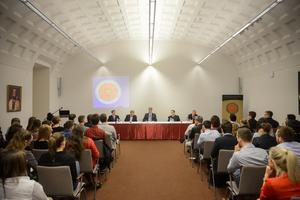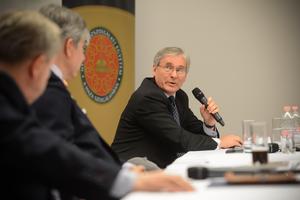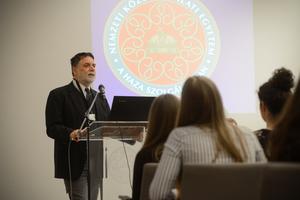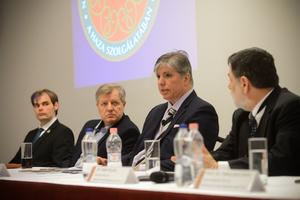Professor Maximilian N. Teleki, President Emeritus of the Hungarian-American Coalition shared his views on contemporary U.S.-Central and Eastern European relations at NUPS on March 18, 2019. The related topics were also addressed by members of the American Studies Research Institute in the form of a round table discussion with Professor Teleki.
Professor Teleki reminded that dating back to the 2000s, there have been inconsistencies in the U.S.: foreign policy towards Hungary and Central Europe largely because of domestic distractions in the United States, competing interests and challenges to U.S. strategic national security interests and due to crises that occurred. Moreover, he emphasized that foreign policy is not conducted in a vacuum but it is largely a reactive process, and it does not dictate American electoral politics unless there is a crisis.
Accordingly, it is worthy to examine the main issues that the United States needs to deal with and relate to Central Europe. It’s very often difficult for American policy-makers to understand in clarity what’s happening in Hungary and in the region of Central Europe without looking at it through the Russian context. The cause of this may be a lack of imagination but it is also rooted in geopolitics and as a result relates to issues like energy security and diversification. In this regard, in the case of the United States there never was a serious strategy to deal with the issue of energy challenges in Hungary which is dependent on Russian natural gas.
This failure creates an opportunity: the lack of consistent U.S. policy is partly the reason why we see Chinese engagement in the wider region. Professor Teleki noted that although he is a “diehard transatlanticist”, he cannot fault the strategy of Hungary or other Central Europeans for trying to figure out the best way to stabilize the economic interest with other actors including powers like China and Russia when the United States is not investing enough in the region. According to Professor Teleki, U.S: foreign policy largely reacts to changes in Hungary in a very inconsistent manner perhaps without appreciating many of the legacies that existed throughout prior decades before 1999 (Hungary’s accession to NATO) and how difficult in a bloodless revolutionary period it is to actually create change in society.
Following Professor Teleki’s remarks, members of the American Studies Research Institute gave voice to their views and questions regarding the United States’ foreign policy towards Central Europe. Strategic Director of the Institute Dr. Tamás Fellegi raised the question whether the lack of strategy means the absence of U.S. strategy or simply an approach based on different focal points. Similarly, Senior Research Fellow Prof. Tamás Magyarics raised the questions whether there is a Russia First policy giving priority to U.S.-Russian relations in determining U.S. relations with Central Europe and whether Europe’s importance after the Cold War decreased in Washington’s foreign policy. Supreme Justice Prof. Dr. István Stumpf, Research Professor at the Institute also raised the question whether Hungary has a strategic military importance for the United States. On this note, Operative Head of the Institute Gábor Csizmazia raised the idea that due to its geographic location, Central Europe is affected by challenges from within and outside the transatlantic community.
According to Professor Teleki, it is interesting to see where NATO and the transatlantic community is both in terms of common values and common strategy, adding that the anchor of this relationship and the Hungarian-American relationship is the military alliance.
written by: Gábor Csizmazia
photos: Dénes Szilágyi



